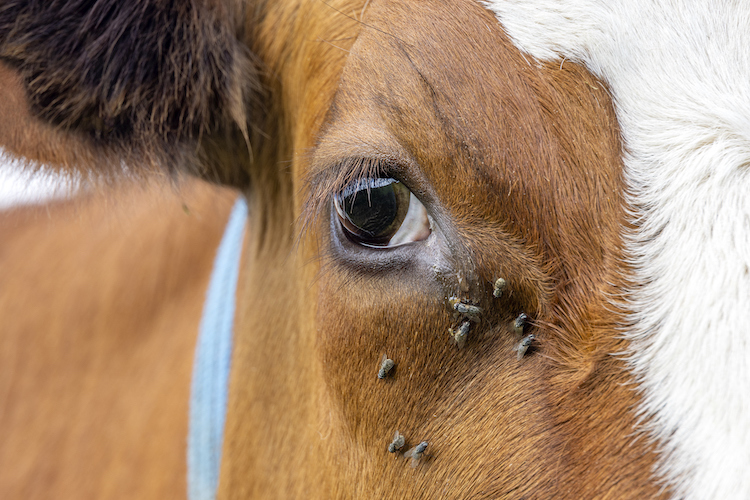
Though a small number of flies is inevitable for a dairy farm, having an excessive number of flies constitutes a problem. Flies, especially those that bite, are a nuisance for cows, heifers, and calves and causes bunching and other avoidance behaviors that prevent animals from eating and lying down. Also concerning is the ability for flies to carry diseases such as pinkeye and mastitis.
“Fly control starts with one basic thing, and that’s sanitation,” emphasized Fred Hall during an Iowa State Extension Dairy News and Views podcast. Flies require moisture to breed, so keeping facilities dry inhibits them from spreading. The fortunate thing for dairies is that sanitation is top of mind for many other reasons as well, like milk quality, said the Extension educator.
Starting with a cleaner environment also means that chemical methods of fly control can be used more sparingly and will be more effective. “If we don’t have that good sanitation program, then the chemical control treatments probably will be of a more limited success because the flies are breeding faster than we can kill them,” Hall explained.
He recognized a number of chemical methods that can be used around the farm, including fly bait and fly sprays. Keep in mind that insecticides applied as space sprays will cause an immediate knock-down of flies, but the product has no residual activity. Supplemental sprays have the same effect, and sanitation is still important because wherever the product isn’t, there can be flies.
Once you have chosen a course of action to control flies, Hall recommended monitoring its success by tacking up an index card or piece of paper in the animals’ environment. Flies will land on the card and often leave a mark by spitting or defecating. Check the card each week to see how the number of marks, and therefore number of flies, compares to the week prior.
“It’s a very effective method to monitor what’s going on with the flies in and about our barns and parlors,” stated Hall.
To find resources for what products are safe to use on specific classes of animals in your state, Hall pointed to a recommendation from Rebecca Trout Fryxell, a medical and veterinary entomologist at University of Tennessee. The VetPestX tool allows you to input what type of pest you’re dealing with in what type of animal to find licensed products that can be helpful in your scenario. He noted that Trout Fryxell described that the flies found on animals on pasture are often horn and face flies, while stable and horse flies are more common in barns and parlors.
The database is updated annually and provides the class of each product. Keeping record of that information will allow you to vary the class you use each year and prevent fly resistance and future problems, continued Hall.








